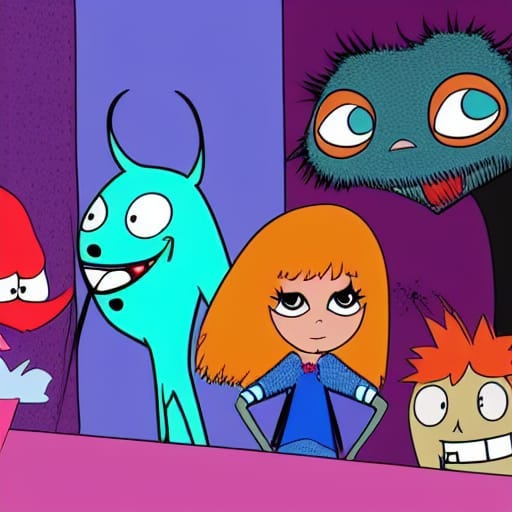Imaginary Friends... Or More? + Podcast Alert (I Was The Guest This Time)
Did you ever have an imaginary friend?
I did. Before smartphones existed, there was only so much that a child bored out of their mind could do to entertain themselves on long car rides.
Brought to you by the magic of AI art (and my imagination)
I would imagine this tall, blonde, athletic woman who could climb over, slide under, or otherwise skillfully and gracefully avoid any barrier in her way. From street lights, to mailboxes, fire hydrants and road safety barriers, my friend made it look easy. 🚧 🏃♀️
I’m pretty sure her existence didn’t extend beyond being a product of my imagination.
But then we also hear stories like this:
We took my 3 year old daughter to meet my wife's grandmother who lived on the other side of the county...we walk in the house and my daughter doesn't even look at her great grandmother, but instead goes straight over to a picture of her great great grandmother, points at it and says, "That's the lady who lives in my room. She's nice." (source)
Assuming that these “invisible companions” children interact with are always the product of imagination is a Euro-Western way of thinking that discounts the validity of other cultures' beliefs and experiences – this is one of the core arguments from an article titled “Reconceptualizing Imaginary Friends: Interdisciplinary Approaches for Understanding Invisible Companions”, which was just published in September.
Dr. Kate Adams, Emma Stanford, and Harpreet Singh, the authors of the article, believe that when investigating children’s imaginary companions, non-Western perspectives should be granted equal status and consideration to that of Euro-Western views:
"As the word imaginary implies, the majority of studies—and particularly those in developmental psychology—do not challenge the underlying assumption that ICs [imaginary companions] are creations of the mind. (...) Adults in India told her [Mills (2003)] that children did not play alone and therefore had no need to create an imaginary friend, but they advised that children did speak to invisible companions. These were considered to exist in a spiritual realm and/or be part of the child’s past-life memory." (p. 33)
Importantly, the authors don’t claim that children’s invisible companions are never made up. Rather, they call for exploring explanations of children’s experiences that go beyond imagination – such as hallucinations (pathological or non-pathological, not a real entity), after-death communications (seeing, hearing, or feeling the presence of a person who passed away, the companion may or may not be a real entity), or children actually perceiving real entities.
Let’s call out the elephant in the room 🐘 – proposing to seriously consider that children may perceive real entities that are invisible to others is a touchy topic. Entertaining this line of thinking may feel naive or silly.
The Euro-Western worldview is one of many ways of making sense of the world across the globe, and it’s natural that to those of us embedded in it, its assumptions may seem common sense (e.g. whatever children see that others around them cannot is ‘obviously’ a product of their imagination).
And yet, once we take a step back from what is ‘obvious’, we might find so much more than meets the eye.
PODCAST ALERT – This time I was in the guest seat
"I love science. I believe it's a wonderful way of gathering knowledge. We should be very careful not to slip into dogma, and make sure we keep sharpening this beautiful tool. And I also believe there are multiple ways of gathering knowledge beyond the scientific lens as well."
Tune into this interview I gave for the WTF Just Happened podcast hosted by Liz Entin. (you can find Liz on Instagram)
We talked about:
🎙️Evidence for an afterlife
🎙️My journey of exploring the intersection of science and spirituality
🎙️The science of parapsychology, and why its findings are not more widely known (i.e. scientific research into phenomena resembling precognition, telepathy, clairvoyance... and evidence supporting their existence!)
🎙️Personal experiences we had with precognition
🎙️Psychic / intuitive and medium readings we experienced
🎙️Staying willing to update our beliefs in the face of new evidence
🎙️Why our identity shouldn't be overly-dependent on our beliefs
🎙️The importance of questioning everything
🎙️How despite it being seen as an objective activity, science is not immune to human biases...
...and so much more!!
With love,
Cristina
Find more of my work at: www.worthfulwoman.com


